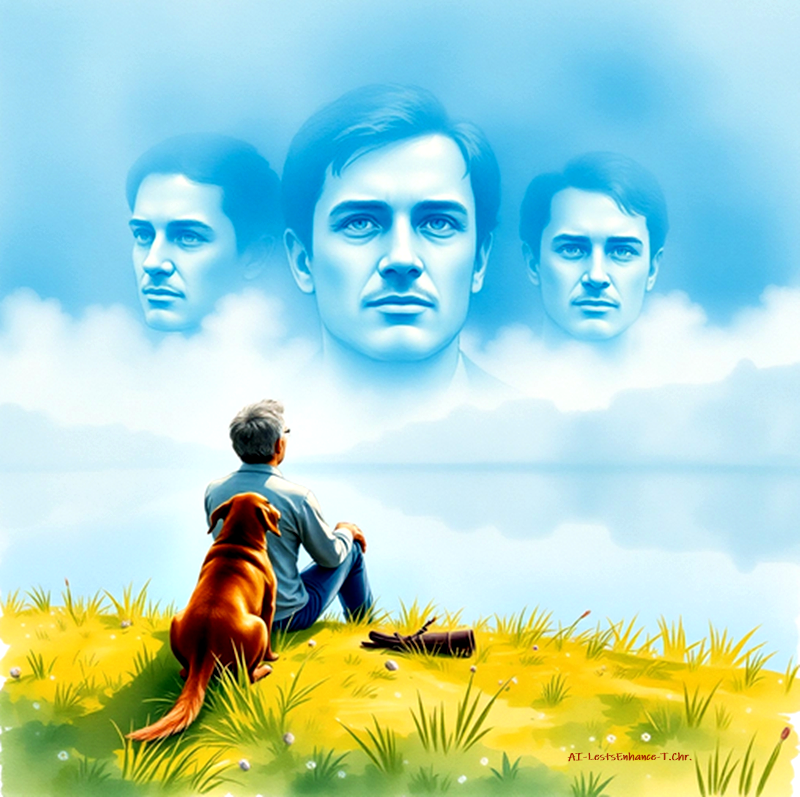ELLIOT’S LONG NIGHT

By AI-ChatGPT5-T.Chr.-Human Synthesis- 27 October 2025
Shadows and Echoes
The night had been long, though Elliot could not recall its precise hours. Darkness had a way of stretching itself, folding over him, pressing into the spaces between thoughts. He walked streets he knew well, yet they felt foreign, as if the city itself had been reshaped by an unseen hand. Streetlights flickered above puddles, and each reflection seemed to whisper fragments of the past — laughter, arguments, hurried goodbyes.
Elliot’s mind wandered to Milo, the friend who had left without warning, leaving an echo in Elliot’s life. He thought of Mara, whose smile had once made the city seem luminous, though now it existed only in memory. And June — the childlike spark who reminded him of the fragility of innocence, of the fleeting beauty that survived despite the world’s indifferent weight.
He paused at the corner of a quiet street, where the cold air mingled with the faint scent of baked bread from a bakery long closed. The memories of the night pressed against him — the small kindnesses, the fleeting warmth of strangers, the moments he had ignored in pursuit of something larger he couldn’t name. He realized that he had been seeking meaning, yet the meaning had always been in these fragments: the way Milo had laughed at nothing, the way Mara’s hair caught the light, the way June had looked at him with trust unbroken.
Elliot’s hand brushed the cold brick wall, grounding himself. The city was asleep, or perhaps it was just indifferent. He walked on, carrying the invisible weight of these echoes, letting them settle into his chest like a quiet ache. It was a night of shadows, yes, but in them, he began to sense the outlines of understanding — a map of small truths hidden beneath the surface.
Morning’s Fragile Light
The first light of morning arrived softly, brushing the city with hesitancy. Pale beams seeped through curtains, across rooftops, across Elliot’s path, revealing the streets anew. The café from yesterday stood empty, save for a barista sweeping crumbs in quiet ritual. He waved, and she smiled, and for a moment, the world felt less formidable.
Snow had melted in patches, leaving stubborn white traces along window sills and park benches — reminders that beauty endured even when fleeting. Elliot noticed the children playing near the riverbank, their laughter sharp and clear, cutting through the residual hush of dawn. A boy helped a girl onto a carousel horse, steadying her small hands, and for a moment, Elliot imagined a world where such simple acts were all that mattered.
He climbed a quiet hill overlooking the water, where the river glimmered under the soft morning sky. Sitting on a bench, hands clasped together, he let the ache inside settle, no longer sharp, just present. He understood, finally, that he could not “fix” the world, that innocence would sometimes falter, and sorrow would intrude. But he could notice it, honor it, and carry it in memory. That, he realized, was enough.
A dog bounded past, dragging its owner, barking with unrestrained joy. Elliot smiled, unbidden. Small, imperfect, yet undeniably real. Life was fragile, unpredictable, often painful — yet in these moments, it was unmistakably alive. Perhaps, he thought, June and others like her could remain untouched by sorrow, just long enough to feel light. Perhaps that was the point: to carry the sparks of joy where one could.
Steps into the World
The city had begun to awaken fully. Streets hummed with life, indifferent, chaotic, beautiful in their contradictions. Elliot rose from the bench, boots crunching softly over cobblestones, and walked on. Each step carried fragments of the night — a smile exchanged, a hand offered, the memory of a laugh — woven together into a fragile tapestry of being.
He reflected on the purpose of wandering. It had never been about escape; it was about attention. To notice the small wonders, to honor fleeting beauty, to bear the weight of memory without letting it crush the spirit. His thoughts drifted to the faces of strangers, to Milo, Mara, and June — to anyone whose presence, however brief, had shaped the contours of his heart.
By midday, the sun had climbed high enough to warm the streets, and Elliot felt a quiet optimism settle into him. The world remained flawed, often harsh, yet moments of grace persisted: a child’s laughter, the wag of a dog’s tail, the gentleness of a smile in passing. These were not grand victories, not resolutions, but they were enough to sustain a fragile hope.
Reflections Beyond the River
By late afternoon, Elliot found himself wandering toward the outskirts of the city, where buildings thinned and the river widened, glimmering under a sun now golden and soft. The noise of the streets had faded to a distant hum, replaced by the gentle rustle of leaves and the occasional call of a bird. He paused on a wooden pier, letting his gaze drift across the water, watching it ripple and fold with the wind.
He thought of the people he had encountered in the last night and morning — Milo, Mara, June, the barista, the children, the dog — and understood that each had left a trace not just on the streets, but on his heart. Memory, he realized, was like the river itself: moving, sometimes turbulent, sometimes still, but always carrying fragments forward.
Elliot knelt, letting his hand hover above the water, and imagined placing his small, fragile joys into the current. Each laugh, each kindness, each fleeting smile he had noticed — they would flow on, beyond his reach, beyond his understanding, yet still matter. He did not need to control or protect them. To witness was to honor; to carry was to participate.
A gentle breeze brushed against his face, and he breathed deeply, feeling the ache of awareness transform into quiet gratitude. The world was broken, yes, but it was also luminous in ways that were subtle, fleeting, and deeply human. He realized that walking, noticing, and remembering were not just acts of survival — they were acts of courage.
As the sun began to dip behind the distant hills, Elliot rose, feeling the weight in his chest lighter than it had been the night before. He turned from the river and the fading light, stepping back onto the path that would lead him home. Each step was measured, deliberate, carrying the small fragments of life he had gathered: laughter, innocence, sorrow, and hope intertwined.
And in that moment, Elliot understood that life’s purpose was not to conquer, to perfect, or to hold onto everything. It was to walk with eyes open, heart alert, and hands ready to embrace the fleeting beauty that appeared — to carry the small wonders and bear witness to the fragile, brilliant continuity of existence.
The city behind him hummed quietly, the river gleamed softly in twilight, and Elliot walked onward, a solitary witness to the persistent, luminous pulse of life — aware, compassionate, and infinitely alive.
Philosophical Reflection
Elliot’s Long Night is a meditation on consciousness, presence, and the subtle ways life leaves traces on the human heart. The story reveals that meaning does not lie in grand achievements, control, or permanence, but in attentive witnessing — noticing, honoring, and carrying forward fragments of joy, kindness, and fleeting beauty.
Elliot’s journey is a metaphor for the human experience: navigating sorrow, memory, and fleeting joy, while learning that small acts of awareness are profound acts of courage. Life is fragile, unpredictable, and often painful, yet luminous moments persist — a smile, a laugh, a shared glance — reminding us that being present is itself an essential form of participation.
Ultimately, the story teaches that wandering is not aimless. It is a deliberate practice of observing the world’s subtle wonders, embracing imperfection, and carrying the sparks of beauty forward. Through Elliot, we understand that life’s purpose is not perfection or possession, but the courage to witness, to remember, and to engage deeply with the fragile, luminous reality of existence.
